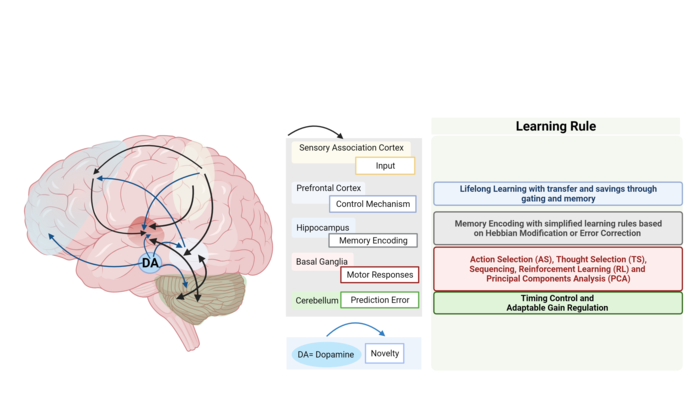Creativity is understood as the creation of novel, useful and surprising solutions. The researchers argue that the associated cognitive processes, such as the ability to abstract, improvise, or think divergently, involve different brain areas that are interconnected. These areas include the cerebellum, hippocampus, prefrontal cortex, and basal ganglia (see figure). Different areas are activated depending on the type of creativity. The similarities and differences between these types of creativity and their neuronal circuits are described by the model with the help of algorithms. Dopamine plays an essential role as a critical modulator for controlling and optimizing creative neural pathways.

Credit: Jacobs University
Creativity is understood as the creation of novel, useful and surprising solutions. The researchers argue that the associated cognitive processes, such as the ability to abstract, improvise, or think divergently, involve different brain areas that are interconnected. These areas include the cerebellum, hippocampus, prefrontal cortex, and basal ganglia (see figure). Different areas are activated depending on the type of creativity. The similarities and differences between these types of creativity and their neuronal circuits are described by the model with the help of algorithms. Dopamine plays an essential role as a critical modulator for controlling and optimizing creative neural pathways.
With this proposed neural network model, the scientists, for the first time, provide a unified framework for seemingly three different forms of creativity. “With this starting point, we hope to thoroughly contribute to a better understanding of the underlying neuronal mechanisms,” said Khalil. “The more we know about these mechanisms, the more specifically we can promote creativity and possibly contribute as promising interventions for people with relevant disturbed brain areas.”
With their model, the scientists also want to initiate a discussion about neurobiology and creativity, adds Radwa Khalil. An associate professor, Ahmed A. Moustafa, from the University of Johannesburg and the School of Psychology at Bond University in Australia, are also involved in the research. As a visiting Professor of the German Academic Exchange Service (DAAD), Moustafa will continue his creativity research this summer at Jacobs University, hosted and led by Professor Dr. Ben Godde Professor of Neuroscience at Jacobs University Bremen.
About Jacobs University Bremen:
Studying in an international community. Obtaining a qualification to work on responsible tasks in a digitized and globalized society. Learning, researching and teaching across academic disciplines and countries. Strengthening people and markets with innovative solutions and advanced training programs. This is what Jacobs University Bremen stands for. Established as a private, English-medium campus university in Germany in 2001, it is continuously achieving top results in national and international university rankings. Its more than 1,600 students come from more than 110 countries with around 80% having relocated to Germany for their studies. Jacobs University’s research projects are funded by the German Research Foundation or the EU Research and Innovation program as well as by globally leading companies.
For more information: www.jacobs-university.de
Facebook | Youtube | Twitter | Instagram | LinkedIn
Journal
Neuroscience
DOI
10.1016/j.neubiorev.2022.104656
Article Title
A neurocomputational model of creative processes
Article Publication Date
3-May-2022




